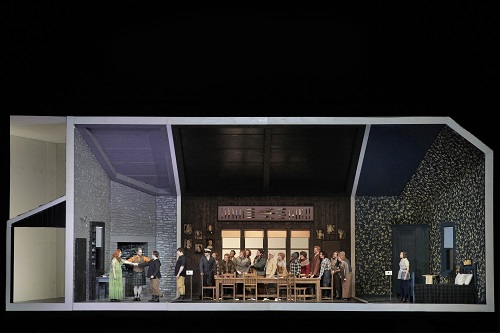 United States Handel, Ariodante: Soloists, Orchestra of Lyric Opera of Chicago / Harry Bicket (conductor). Civic Opera House, Chicago. 2.3.2019. (JLZ)
United States Handel, Ariodante: Soloists, Orchestra of Lyric Opera of Chicago / Harry Bicket (conductor). Civic Opera House, Chicago. 2.3.2019. (JLZ)

Production:
Conductor – Harry Bicket
Original Director – Richard Jones
Revival Director – Ben Davis
Designer – ULTZ
Lighting designer – Mimi Jordan Sherin
Puppetry designers – Finn Caldwell & Nick Barnes
Puppetry director – Finn Caldwell
Choreographer – Lucy Burge
Chorus master – Michael Black
Cast:
Ariodante – Julie Miller
Ginevra – Brenda Rae
Dalinda – Heidi Stober
Polinesso – Iestyn Davies
King of Scotland – Kyle Ketelsen
Lurcanio – Eric Ferring
Odoardo – Josh Lovell
With this series of performances, Handel’s Ariodante (1735) received its Lyric Opera of Chicago premiere. Based on cantos 4–6 of Ariosto’s Orlando furioso, the libretto concerns love interrupted by intrigues that ultimately fail, as virtue triumphs over petty, self-serving plots.
The plot might confound some listeners. After the stage is set with the nuptials of Ariodante and Ginevra (the latter is the daughter of the King of Scotland), the former will become the King’s heir, but a jealous courtier Polinesso engages Dalinda to impersonate Ginevra and portray her as a wanton. This sets in motion a story of deception, dishonor, and disguise. At the end, when the story is finally illuminated, the King restores his daughter’s honor, and she is reunited with Ariodante.
In this production, however, the director revised the plot to have Ginevra leave the nuptial celebration at the conclusion. While this is explained in the program notes, the rationale for this decision is unconvincing. To apply the theater of Ibsen and Strindberg to an important work by Handel is a significant departure, and it suggests that the libretto and score of an opera are detachable. Updating is not merely finding something different to do with an opera. When updating occurs successfully, it should add something to the presentation. That stated, changing the setting to 1970s Scotland is distracting and detracts from the courtly narrative of the time, which relies heavily on a traditional sense of honor.
Also, to cast Polinesso as a charlatan preacher is problematic, especially with scriptural statements appearing in the surtitles during the overture and intermittently elsewhere. Ultimately Handel’s score endures such updating because of the outstanding musical content and libretto, helped by Lyric’s promising cast.
In the title role, Julie Miller substituted for an ailing Alice Coote. Miller’s first aria ‘Quì d’amor ne suo linguaggio’ sounded cautious, but by the second-act aria ‘Scherza infida’, her familiarity with the part became clear. Her third-act aria, ‘Cieca notte’, aptly conveyed Ariodante’s reaction to the deception and in changing the tone, set the scene for the dénouement.
As Ginevra, Brenda Rae also sounded initially tentative, but she was able to bring out the role’s soaring high notes. If at times the florid passages sounded blurred, they had to compete with Bicket’s rich orchestra in some of the more extroverted passages. Rae summoned up more intensity for the second-act aria, ‘Il mio crudel martoro’.
Countertenor Iestyn Davies gave a fine reading of Polinesso, with his musicality surpassing his characterization. He set the tone from the start, and later in the first act presented ‘Coperta la frode’ with consummate mastery. Davies gave clarity to the details, in one of the strongest pluses of the evening. In a similar way, Kyle Ketelsen was exemplary as the King of Scotland. Ketelsen’s rich, round tone was always clear and eminently articulate. He was particularly strong in ‘Voli colla sua tromba’, the aria that precedes accusations of his daughter Ginevra’s wantonness, but was secure and engaging throughout.
As Dalinda, Heidi Stober was similarly secure, but sometimes sounded a bit strained. Her reading of the first-act aria ‘Apri le luci’ left a strong impression, with an ardent character portrayal helped by strong stage presence and vibrant tone. Likewise, first-year Ryan Opera Center member Eric Ferring gave an exemplary impression as Lurcanio. Ferring was among the strongest of the evening, with a full-bodied tenor offering luster, lyricism, and impressive phrasing. He was assured from the start, with ‘Del mio sol vezzosi’ as firm as it should be. Even more impressive — commanding and stylish — was the second-act aria ‘Il tuo sangue’, in which Lurcanio demands justice for his brother’s death.
Those familiar with the score — one of Handel’s mature operas — will find much to enjoy. Quibbles with the staging aside, the score endures and thrives in the hands of conductor Harry Bicket, whose sense of pacing and flow were high points of the evening.
James L. Zychowicz